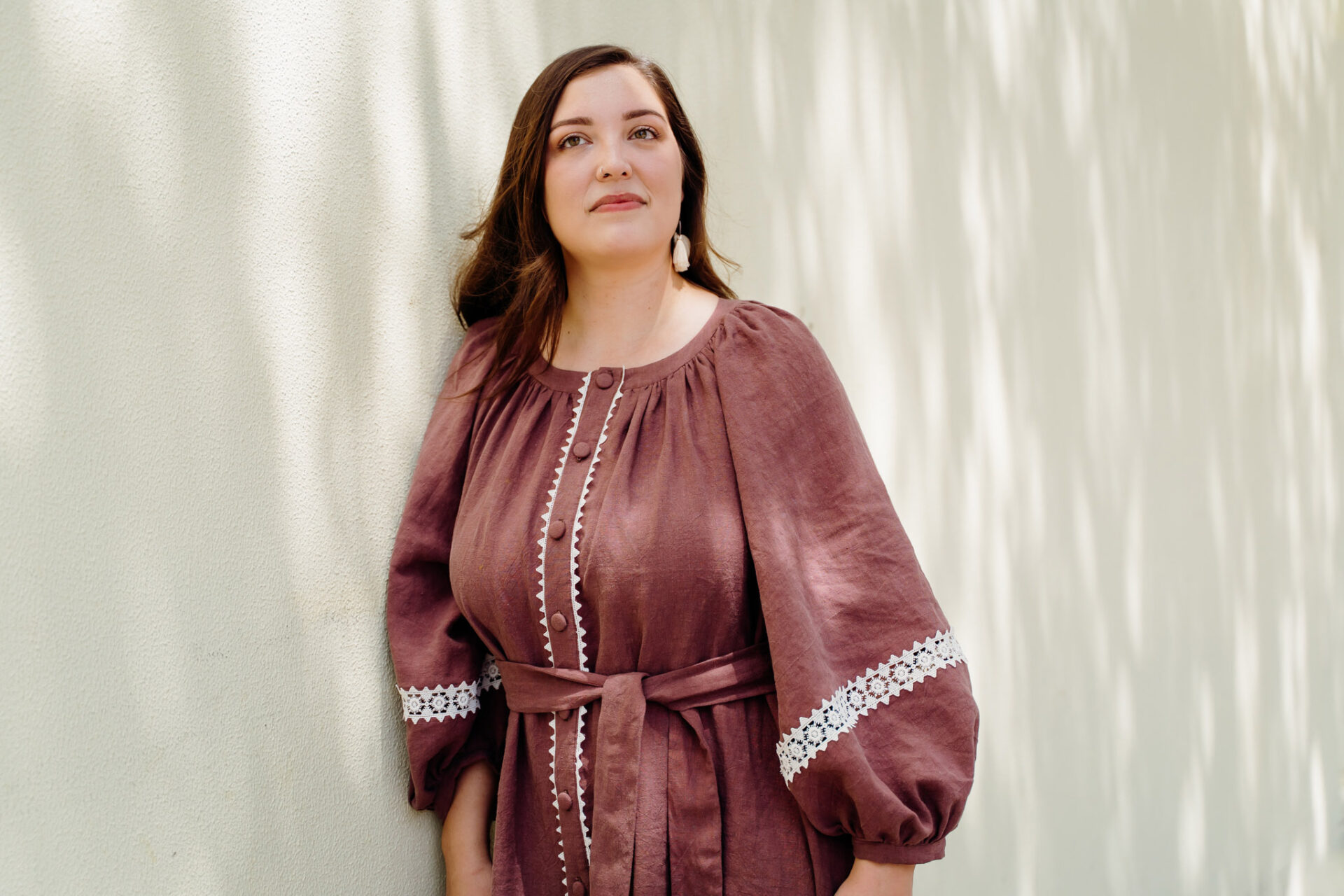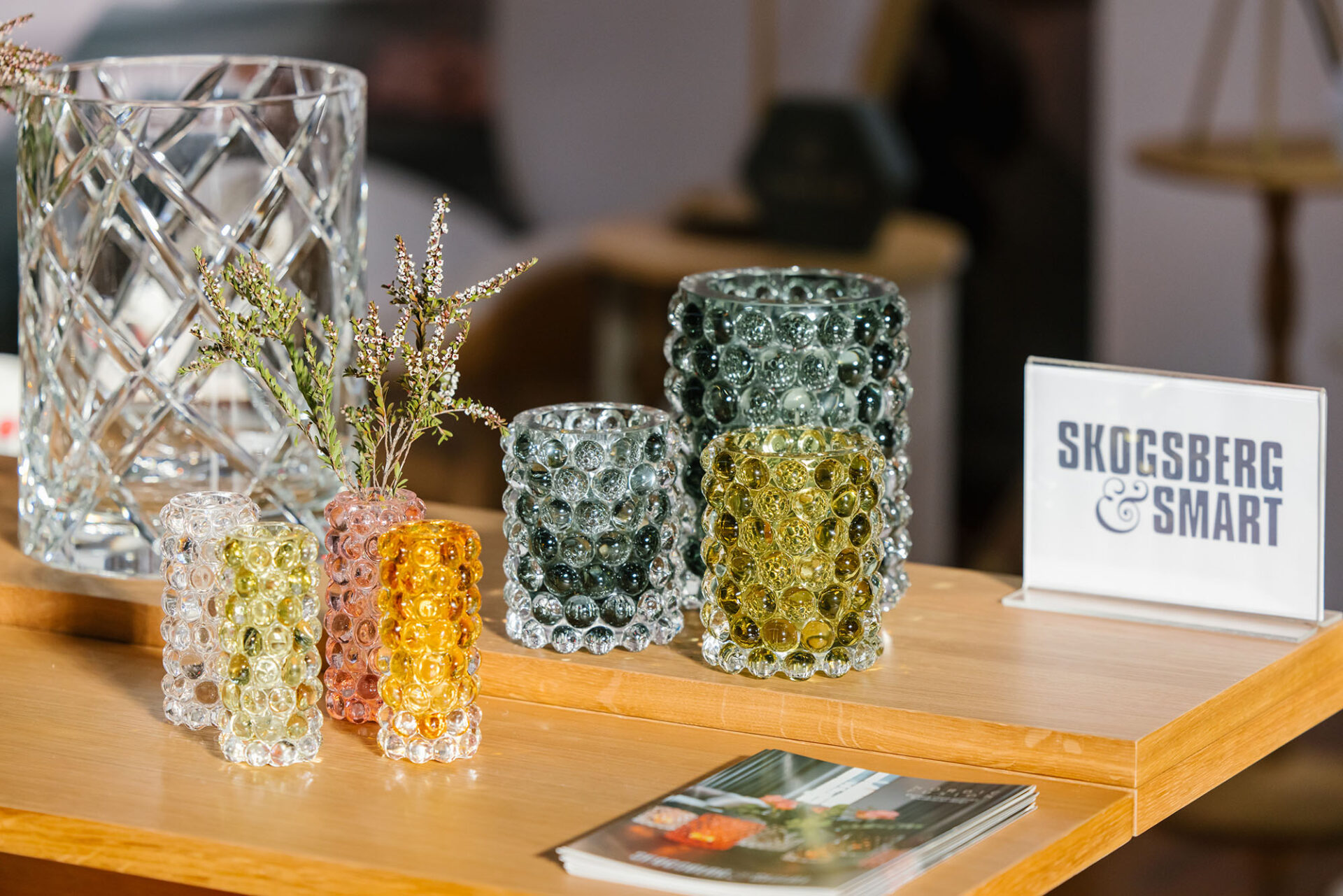“We’re all stardust”: pianist Rose Riebl on the power of silence and creating from loss – and life
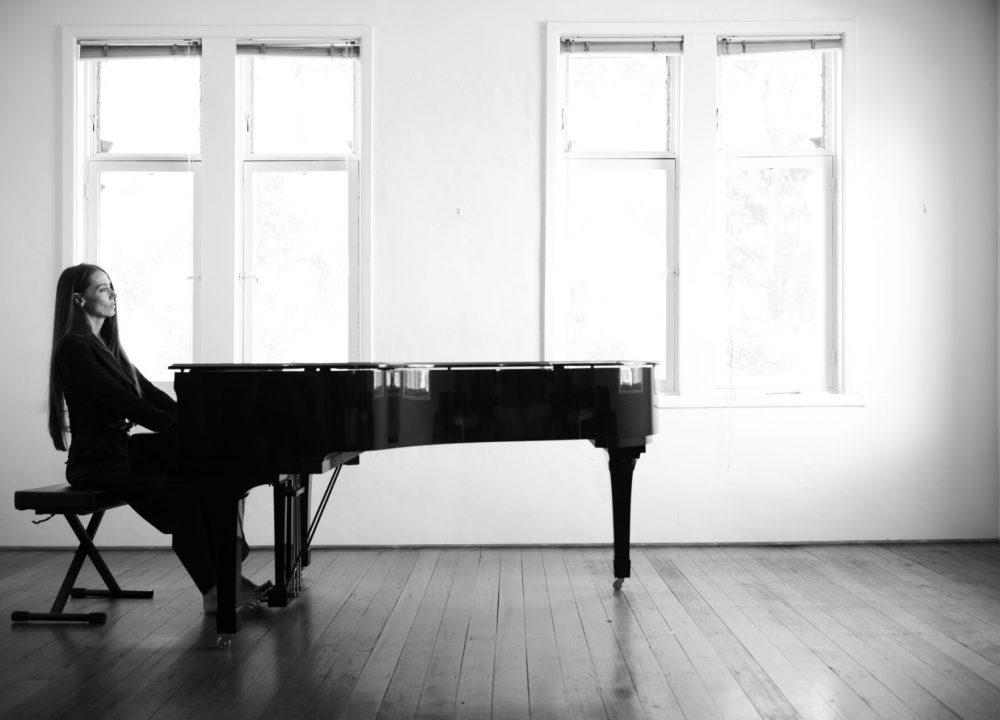
- Words by Donnay Torr
Some kinds of wisdom only arrive through transformation – the sort that comes from holding both an ending and a beginning in your hands at once. For pianist and composer Rose Riebl, this wisdom is woven into every note of her new album Dust, a work written in the space between her brother’s death and her daughter’s birth.
Due for release on November 14, Dust is Rose’s second album, and finds her expanding beyond her neoclassical roots, weaving guitar, drums, and ambient textures into her signature piano work. The result is an album that holds space for grief and joy to coexist, where silence becomes as meaningful as sound.
The album’s latest single, ‘Falling’ marks new territory for Rose: her first venture into lyric writing. Born from her score for Harley & Katya, an International Emmy-winning documentary tracing the story of figure-skating duo Harley Windsor and Katya Alexandrovskaya, the track builds from delicate piano motifs into something darker and more turbulent, featuring lines borrowed from Mahmoud Darwish’s poem Mural: “like when you named me / a storm on a wide sea”. It’s a song about longing, flight, fear, wonder, and love – the push-pull of hope and distress and growth.
We chatted to Rose to find out more about how she transforms life’s most seismic moments into sound.
PHOTOS: ALLI WOODS
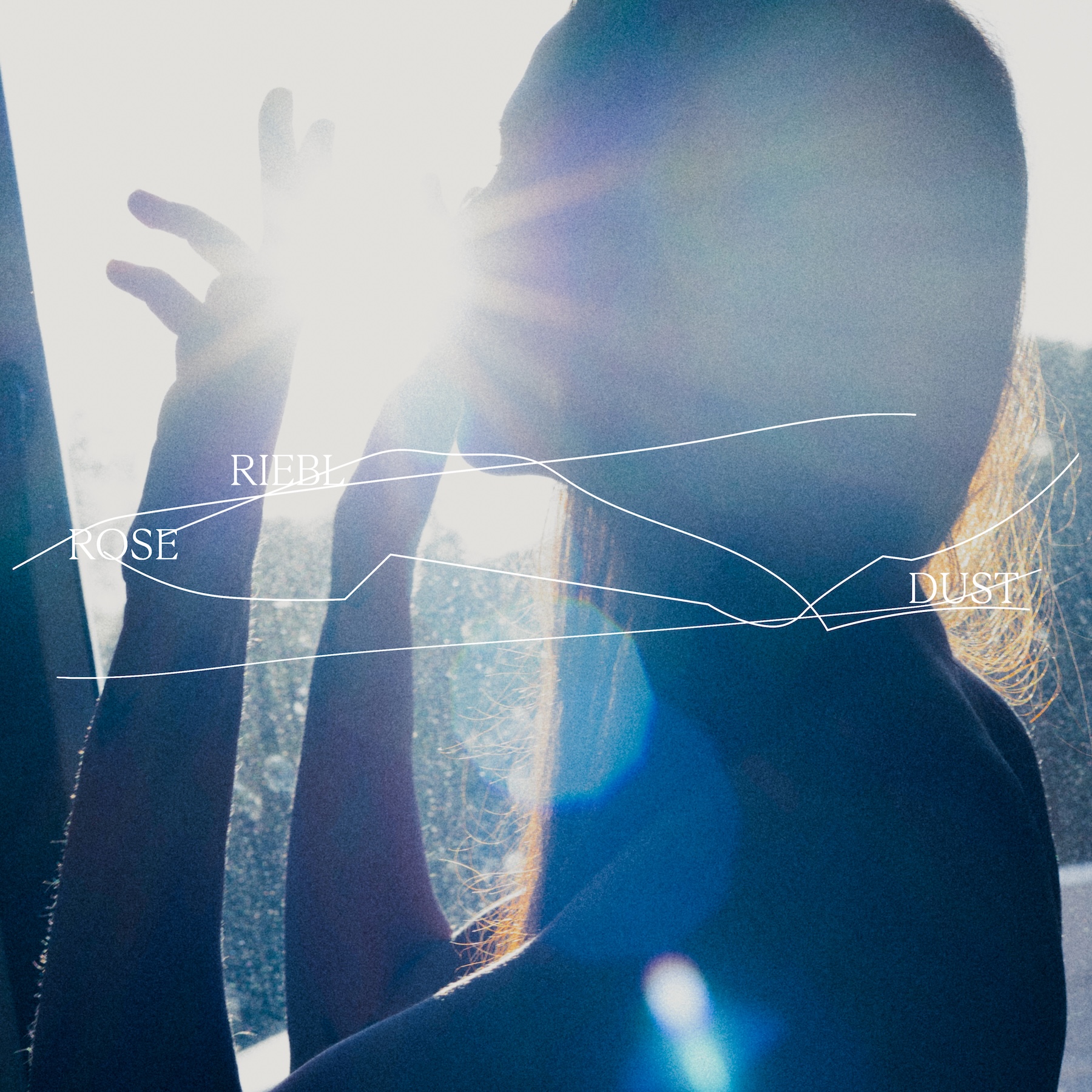
Dust was written across a profound period – from your brother’s death to your daughter’s birth. How did you use your composing process to navigate these life-changing events? Was slowness, or perhaps a deliberate ‘taking your time’, part of this?
I didn’t set out to write an album bookmarked by these events, but they are the stuff of life, and we create in order to make sense of our lives. In the same way, the slowness wasn’t conscious, more tectonic plates shifting, rivers carved through rock. And the presence to be there fully for moments that are painful and profound, and to have the strength not to look away. Composing was a lifeline. It’s work, focus, it’s self-expression, it’s a sacred place.
Your music is rooted in neoclassical minimalism, which requires restraint and space. What can be said in silence that couldn’t be expressed with more complex soundscapes?
I love silence. I love how ‘silent’ contains the same letters as ‘listen’. I love switching everything in the house off and feeling the energy shift and air still. We live in a world that’s increasingly loud and fast and stimulating but the silent wonder in collecting stones and flowers with my daughter is unmatched.
I’m not sure exactly what can be said in silence that can’t be said in a more complex soundscape, but I know the ability to sit in silence is profoundly moving. Like floating in the ocean. The quiet gift of being held in water, baptism, earth, nature, silence, space.
I love silence. I love how ‘silent’ contains the same letters as ‘listen’.
You’ve spoken about the ‘poetic revelation’ that we’re made of stardust and return to dust. How does this philosophical framework influence your compositional choices?
It’s the most poetic thing I know about being alive! We are all stardust, everything is connected. Leaves from the same great tree. When we die we return like drops to the ocean. When love is so intense, and loss of that love so painful, it’s something to hold onto. We have one wild and precious life, we love deeply, our hearts are broken, we return to the place we started. Time is a circle.
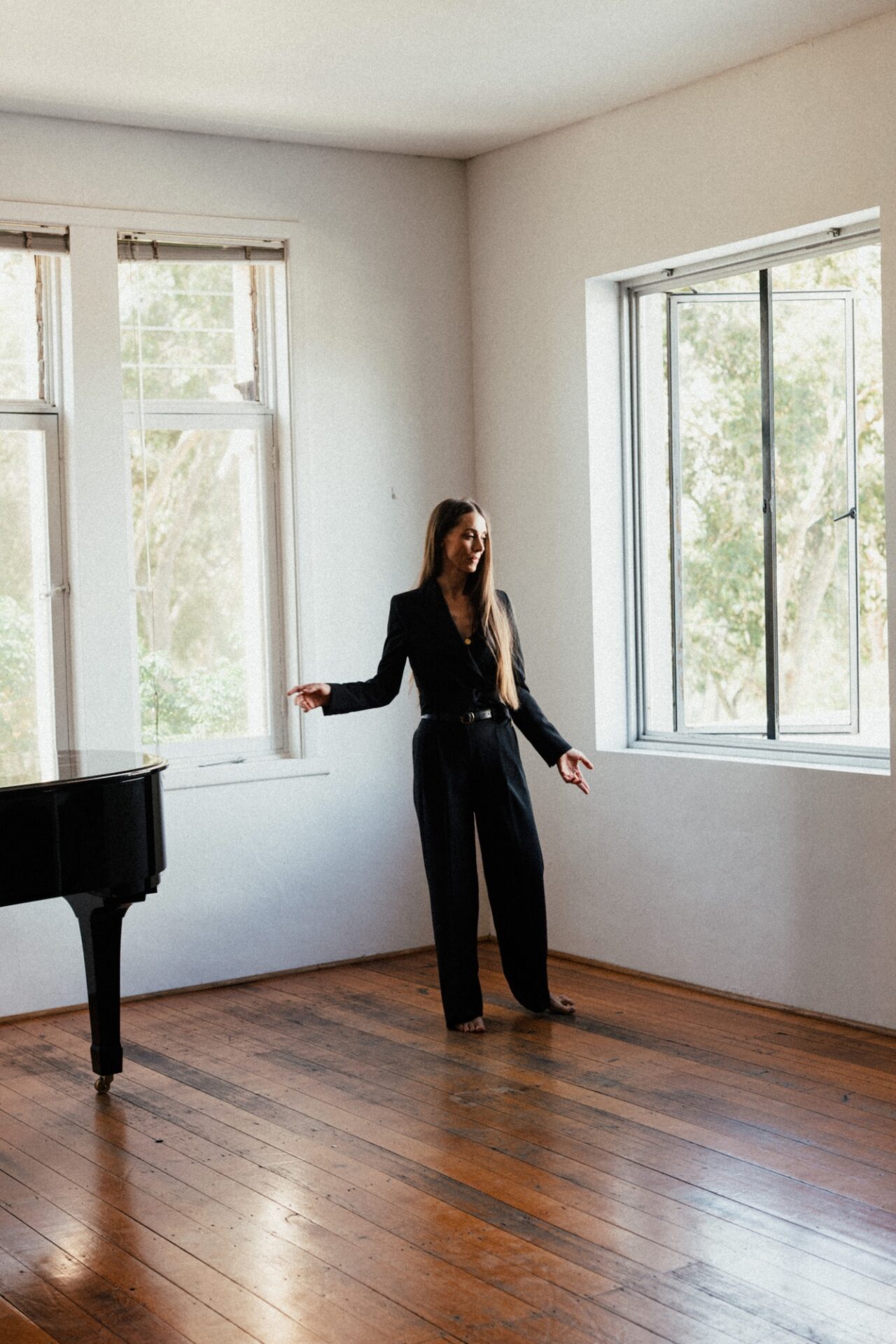
‘Falling’ is your first track containing lyrics, and you describe the song as one that “presented itself” to you, starting as a piano improvisation. What changed when you added words to the music, how did it impact your storytelling?
It changed completely! The original piano improv is quite floaty and gentle, the lyric version grew teeth and bones and wings. The story wasn’t really mine, and – as all songs become – also was. The lyrics grew into something more powerful than the original song, and so I added a minor chorus at the end and big distorted guitar layers. I’m always telling stories in my songs, imagining films that haven’t been made yet, places real and imagined – so this felt like a natural progression.
Dust holds both grief and joy, and explores themes of impermanence and mortality. How has accepting life’s transience shaped not only what you compose, but how you compose?
I’m not sure if it’s directly impacted how I compose, but it’s impacted how I live and they are pretty intertwined. Every moment is precious, every day counts. Everything I do I do not only for myself but also my brother who didn’t get a chance, and my daughter who has just arrived here. Things are bigger than me and I’m part of a much more profound and interconnected constellation of things. I think I’m sad and elated and grateful in a way you can only be once you’ve walked through fire and come out the other side.
Every moment is precious, every day counts.
Despite incorporating guitar, drums, and ambient textures, piano remains central to your work. What draws you back to the piano, and how does its acoustic nature fit into your slower, more intentional approach to artistry?
I’ve been playing piano since I was 5! And it will always be the instrument and place I come back to. It’s the first language I know, and a companion through all of life’s challenges. It’s like a jungle cat, a whale, a secret language, a lover, a ship, the whole universe. When I play it feels like sinking into another space, another sphere. Sometimes it’s fast and intense, other times slow. But it’s very physical, and you are in a slightly different version of time. Like when you’re in the ocean, you don’t ask tides to keep time with you, you feel yourself as part of their pull. Piano takes you under, and it brings you back up.
JOIN OUR MAILING LIST
Brighten up your inbox with our not-too-frequent emails featuring Peppermint-related news, events, competitions and more!
explore
More articles
Look, I don’t want to make anyone panic but IT’S DECEMBER!!! If you’re planning to give homemade gifts, you’re going to have to act fast. …
Hang out with us on Instagram
🌻 The Paddington 🌻
This is a much-loved staple, created for Issue 50 in 2021. We love seeing the #PeppermintPaddingtonTop continually popping up in our feeds!
How stunning is our model Elon MelaninGoddessEfon – she told us it was one of the first times she had been asked to come to a shoot with her natural hair. 🌻
We worked with South African patternmaker Sarah Steenkamp of @FrenchNavyNow_ to create this wardrobe essential – the perfect puff-sleeve blouse. Raglan sleeves make it the ultimate beginner sew, plus the gorgeous back buttons let you add your own personal twist.
Pattern via the link in bio! 🪡
Photos: @KelleySheenan
Fabric: @Spoonflower
Model: MelaninGoddessEfon

“In the 1940’s, Norwegians made and wore red pointed hats with a tassel as a form of visual protest against Nazi occupation of their country. Within two years, the Nazis made these protest hats illegal and punishable by law to wear, make, or distribute. As purveyors of traditional craft, we felt it appropriate to revisit this design.”
Crafters have often been at the heart of many protest movements, often serving as a powerful means of political expression. @NeedleAndSkein, a yarn store in Minnesota, are helping to mobilise the craftivists of the world with a ‘Melt The Ice’ knitting pattern created by @Yarn_Cult (with a crochet pattern too), as a way of peaceful protest.
The proceeds from the $5 pattern will go to local immigrant aid organisations – or you can donate without buying the pattern.
Raise those needles, folks – art and craft can change the world. 🧶
Link in bio for the pattern.
Images: @Gather_Fiber @NeedleAndSkein @a2ina2 @KyraGiggles Sandi.204 @WhatTracyMakes AllieKnitsAway Auntabwi2
#MeltTheIce #Craftivism #Knitting #CraftForChange

TWO WEEKS TO GO! 🤩
"The most important shift is moving from volume-led buying to value-led curation – choosing fewer, better products with strong ethics, considered production and meaningful stories. Retailers have real influence here: what you buy signals what you stand for. At Life Instyle, this means using the event to discover and invest in small-scale, planet-considerate brands that align with your values and your customer’s conscience. Consumers don’t need more things; they need better things, and retailers play a key role in selecting, contextualising, and championing why those products matter."
Only two more weeks until @Life_Instyle – Australia`s leading boutique retail trade show. If you own a store, don`t miss this event! Connect with designers, source exquisite – and mindful – products, and see firsthand why this is Australia’s go-to trade show for creatives and retailers alike. And it`s free! ✨️
Life Instyle – Sydney/Eora Country
14-17 February 2026
ICC, Darling Harbour
Photos: @Samsette
#LifeInstyle #SustainableShopping #SustainableShop #RetailTradeEvent

Calling all sewists! 📞
Have you made the Peppermint Waratah Wrap Dress yet? Call *1800 I NEED THIS NOW to get making!
This gorgeous green number was modelled (and made) by the fabulous Lisa of @Tricky.Pockets 🙌🏼
If you need a nudge, @ePrintOnline are offering Peppermint sewists a huge 🌟 30% off ALL A0 printing 🌟 when you purchase the Special Release Waratah Wrap Dress pattern – how generous is that?!
Head to the link in bio now 📞
*Not a real number in case that wasn`t clear 😂
#PeppermintWaratahWrapDress #PeppermintPatterns #SewingPattern #WrapDress #WrapDressPattern

8 Things to Know About January 26 - from @ClothingTheGaps:
Before you celebrate, take the time to learn the truth. January 26 is not a day of unity it’s a Day of Mourning and Survival for Aboriginal and Torres Strait Islander peoples.
It marks the beginning of invasion, dispossession, and ongoing colonial violence. It’s time for truth-telling, not whitewashed history.
Stand in solidarity. Learn. Reflect. Act.
✊🏽 Blog written by Yorta Yorta woman Taneshia Atkinson.
🔗 Link in bio of @ClothingTheGaps to read the full blog
#ChangeTheDate #InvasionDay #SurvivalDay #AlwaysWasAlwaysWillBe #ClothingTheGaps

As the world careens towards AI seeping into our feeds, finds and even friend-zones, it`s becoming increasingly hard to ignore.
We just wanted to say that here at Peppermint, we are choosing to not print or publish AI-generated art, photos, words, videos or content.
Merriam-Webster’s human editors chose `slop` as the 2025 Word of the Year – they define it as “digital content of low quality that is produced usually in quantity by means of artificial intelligence.” The problem is, as AI increases in quality, it`s becoming more and more difficult to ascertain what`s real and what`s not.
Let`s be clear here, AI absolutely has its place in science, in climate modelling, in medical breakthroughs, in many places... but not in replacing the work of artists, writers and creatives.
Can we guarantee that everything we publish is AI-free? Honestly, not really. We know we are not using it to create content, but we are also relying on the artists, makers and contributors we work with, as well as our advertisers, to supply imagery, artwork or words created by humans. AI features are also creeping into programs and apps too, making it difficult to navigate. But we will do our best to avoid it and make a stand for the artists and creatives who have had their work stolen and used to train AI machines, and those who are now losing work as they are replaced by this energy-sapping, environment-destroying magic wand.
Could using it help our productivity and bottom line? Sure. And as a small business in a difficult landscape, that`s a hard one to turn down. We know other publishers who use AI to write stories, create recipes, produce photo shoots... but this one is important to us.
`Touch grass` was also a Merriam-Webster Word of the Year. We`ll happily stick with that as a theme, thanks very much. 🌿









